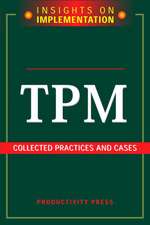Balancing Exploration and Exploitation by Creating Organizational Think Tanks
Autor Tatjana-Xenia Puhan Cuvânt înainte de Prof. Dr. Jetta Frosten Limba Engleză Paperback – 15 mai 2008
Preț: 379.48 lei
Nou
Puncte Express: 569
Preț estimativ în valută:
72.62€ • 77.65$ • 60.54£
72.62€ • 77.65$ • 60.54£
Carte tipărită la comandă
Livrare economică 17 aprilie-01 mai
Preluare comenzi: 021 569.72.76
Specificații
ISBN-13: 9783834909350
ISBN-10: 3834909351
Pagini: 143
Ilustrații: XI, 143 p.
Dimensiuni: 148 x 210 x 8 mm
Greutate: 0.21 kg
Ediția:2008
Editura: Gabler Verlag
Colecția Gabler Verlag
Locul publicării:Wiesbaden, Germany
ISBN-10: 3834909351
Pagini: 143
Ilustrații: XI, 143 p.
Dimensiuni: 148 x 210 x 8 mm
Greutate: 0.21 kg
Ediția:2008
Editura: Gabler Verlag
Colecția Gabler Verlag
Locul publicării:Wiesbaden, Germany
Public țintă
ResearchCuprins
Problems and concepts of R&D alignment.- Shifting think tanks from the macro-to a meso-level.- Critical issues of the organizational think tank approach.- Conclusion.
Notă biografică
Tatjana-Xenia Puhan ist wissenschaftliche Mitarbeiterin von Prof. Dr. Markus Nöth am Lehrstuhl Bankbetriebslehre und Behavioral Finance an der Universität Hamburg.
Textul de pe ultima copertă
Key for successful knowledge management is a balance between exploration and exploitation. Danger arises when exploration is neglected in favour of exploitation since that may result in an organization which lacks innovation capability. In order to prevent this, an idea has been put forward in recent knowledge management research called ambidexterity, which means the simultaneous and balanced pursuing of both exploration and exploitations activities.
Tatjana-Xenia Puhan follows up on this idea by concluding that ambidexterity need not necessarily be implemented in one single organization but can also be realised in a network of associated organizations. The interorganizational ambidexterity is based on co-specialisation: one organisation is devoted solely to exploration while associated organizations focus on their competences in exploitation. Furthermore, the author develops the concept of think tanks as organizations that concentrate on radical innovations while their network associates exploit this newly generated knowledge commercially. Against the background of the hitherto largely inconclusive debate, this work is an outstanding contribution both to knowledge management research and to practical organisational structuring.
Tatjana-Xenia Puhan follows up on this idea by concluding that ambidexterity need not necessarily be implemented in one single organization but can also be realised in a network of associated organizations. The interorganizational ambidexterity is based on co-specialisation: one organisation is devoted solely to exploration while associated organizations focus on their competences in exploitation. Furthermore, the author develops the concept of think tanks as organizations that concentrate on radical innovations while their network associates exploit this newly generated knowledge commercially. Against the background of the hitherto largely inconclusive debate, this work is an outstanding contribution both to knowledge management research and to practical organisational structuring.












